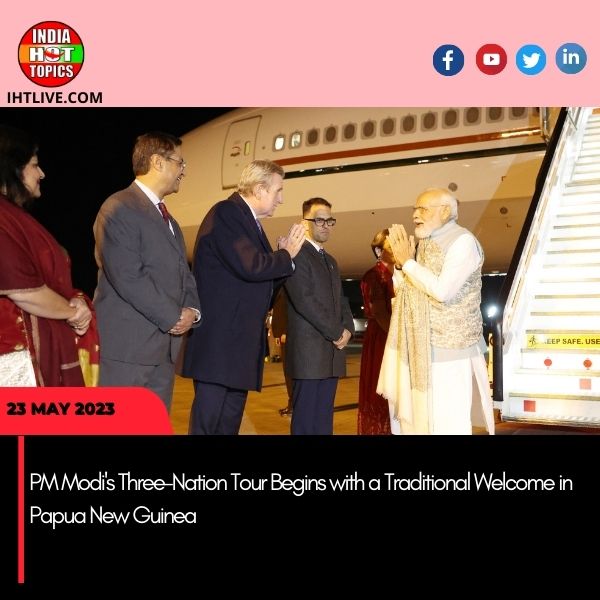World
Kabaddi coach from Moga, Punjab, was killed in the Philippines.

Kabaddi coach from Moga, Punjab, was killed in the Philippines. The coach, who was in his early 30s, was killed by a group of men who were reportedly drunk. The incident took place on Sunday night, when the coach was out for a walk. The men reportedly attacked him with knives and stones, and he succumbed to his injuries. The coach’s body has been sent to his hometown in Punjab for the last rites.
Gurpreet Singh Gindru was in Philippines from the past four years. The 43-year-old was allegedly shot in the head after a break-in at his residence. Gurpreet was a kabaddi coach from Punjab’s Moga.
According to local media, authorities indicated that they have not yet been able to identify the shooters and that they have not yet determined why they opened fire. This is the latest report of hate crimes committed against the Indian diaspora worldwide.
Group Media Publications
General News Platform – https://ihtlive.com/
Entertainment News Platforms – anyflix.in
Construction Infrastructure and Mining News Platform – https://cimreviews.com/
Podcast Platforms – https://anyfm.in/
Social Media
UK man buys World War I shipwreck for just ₹34,000 after spotting it on Facebook Marketplace

Dom Robinson, a UK shipwreck enthusiast, has purchased a sunken 1917 cargo ship for just 300 pounds online. The 3,300-tonne ship, which spans 330 feet, was sunk by a German submarine off the coast of Cornwall on November 27, 1917. Since then, it has remained submerged beneath the sea. Robinson, a diving enthusiast and shipwreck researcher, has.
Discovered around 20 to 25 shipwrecks over the past few years. He uses seabed scans to search for anomalies and investigates them. Robinson shares these underwater adventures on his YouTube channel. He has identified around 20 or 25 shipwrecks in the last couple of years Finding it particularly rewarding as each shipwreck has a story associated with it. However.
His wife Suzi, who bought the ship, was furious and called it a waste of money. Despite this, Robinson remains hopeful about one particular discovery he still hopes to make – the ship’s bell In an extraordinary turn of events, Dom Robinson, a 53-year-old British diver and shipwreck enthusiast, has become the legal owner of a World War I-era shipwreck after.
Purchasing it for just £300 (approximately ₹34,000) on Facebook Marketplace. The wreck in question is the SS Almond Branch, a 3,300-tonne, 330-foot-long cargo ship that was torpedoed by a German submarine on November 27, 1917, off the coast of Cornwall. The vessel has but found only “a big pile of rusting iron” . Undeterred, Robinson proceeded with the purchase.
It from the British government in the 1970s but found little valuable material. After the transaction, Robinson became the legal owner of the wreck, which he plans to preserve for its historical value, continuing his passion for underwater exploratio.
Robinson, who has been passionate about exploring shipwrecks since childhood, came across the listing for the SS Almond Branch on Facebook Marketplace in January 2025. Recognizing the opportunity, he contacted the seller, who had previously acquired the wreckage from the British government in the 1970s. The original owner had hoped to uncover valuable materials
Following the transaction, Robinson received formal ownership documentation from the UK’s Receiver of Wreck, the government official responsible for managing shipwreck ownership. This official recognition made him the legal owner of the SS Almond Branch. Robinson, an experienced diver with over 40 years of exploration and more than 20 identified underwater.
While the SS Almond Branch contains little salvageable treasure, Robinson values it as a historical relic and a personal diving site. He notes that the wreck has general cargo remains and a missing gun mount, sparking curiosity about its past. Despite his ownership, the site remains accessible to other divers, allowing for continued exploration and study.
This unique acquisition highlights the intersection of modern technology, historical preservation, and personal passion. Robinson’s purchase underscores the potential for individuals to engage with history in unconventional ways, turning a simple online marketplace transaction into a profound connection with the past wrecks, including three..
Royal Navy ships, shares his underwater adventures on his YouTube channel, Deep Wreck Diver A UK man, Dom Robinson, purchased a World War I-era shipwreck for just ₹34,000 (£300) after spotting it on Facebook Marketplace. The wreck, the SS Almond Branch, was torpedoed by a German submarine in 1917 and had been submerged off Cornwall’s coast.
Robinson, an experienced diver, recognized the opportunity and bought the wreck from a previous owner who had acquired it from the British government in the 1970s. While the wreck holds little material value, Robinson now legally owns it and plans to preserve its historical significance, continuing his passion for shipwreck exploration.
- Group Media Publication
- Construction, Infrastructure and Mining
- General News Platforms – IHTLive.com
- Entertainment News Platforms – https://anyflix.in/
Saudi Billionaire Prince
Why is 36-year-old Saudi billionaire Prince Al-Waleed called the ‘Sleeping Prince’?

Prince Al-Waleed bin Khaled bin Talal, also known as the “Sleeping Prince,” has been in a coma since a 2005 car accident while studying at a military college. He has been in a coma for nearly 20 years, and his family remains hopeful. Prince Al-Waleed has been on a ventilator and is fed through a feeding tube for the past two decades. In 2019, he reportedly showed slight signs.
Despite medical advice to end life support, his father, Prince Khaled bin Talal Al Saud, stood on life support. of awareness, but these gestures did not signal a to full consciousness firm in his belief His family remains hopeful for his recovery and the continued support he on life support receives in Riyadh and chose to continue the fight for his son’s life.
Prince Al-Waleed is not a direct son or brother of the current monarch, but his grandfather, on life support. Prince Talal bin Abdulaziz Al Saud, was one of the many sons of King Abdulaziz Al Saud, the founding monarch of modern Saudi Arabia. King Salman bin Abdulaziz Al Saud, the current ruler, is also a son of King Abdulaziz, making him Prince Al-Waleed’s great-uncle.
Prince Al-Waleed bin Khaled bin Talal of Saudi Arabia, often referred to as the “Sleeping families dealing with long-term comatose conditions. Prince,” has been in a coma since 2005 following a severe car accident in London. At the time, he was a 16-year-old military college student. The accident resulted in a brain hemorrhage, leaving him unconscious dependent.
Now 36 years old, Prince Al-Waleed remains hospitalized at King Abdulaziz Medical City in Riyadh, where he is kept alive through mechanical ventilation and a feeding tube. Despite medical advice to consider ending life support, his father, Prince Khaled bin Talal Al Saud, has steadfastly refused, expressing unwavering faith in his son’s potential recovery. He has stated,
In 2019, there were brief signs of limited awareness when Prince Al-Waleed reportedly moved his fingers and slightly turned his head. These moments, though fleeting, provided a glimmer of hope to his family Prince Al-Waleed is the great-grandson of King Abdulaziz, the founder of modern Saudi Arabia, making him a member of the royal House of Saud. His father, Prince.
The term “Sleeping Prince” has become synonymous with Prince Al-Waleed’s prolonged coma, symbolizing both the tragedy of his condition and the enduring hope of his family. His story has resonated deeply within Saudi Arabia and beyond, highlighting the emotional Khaled, is a nephew of King Salman bin Abdulaziz Al Saud, the current monarch complexities faced by.
As of April 2025, Prince Al-Waleed continues to receive care, with his family and supporters holding onto hope for his recover families dealing with long-term comatose conditions If God had wanted him to die in the accident, he would have been in his grave now Prince Al-Waleed bin Khaled bin Talal of Saudi Arabia, often referred to as the “Sleeping Prince,” has remained.
At the time of the incident, he was just 16 years old and studying at a military college in London. The accident resulted in a severe brain hemorrhage, and despite immediate medical intervention, he slipped into a coma from which he has never fully recovered. Today, he is 36
The nickname “Sleeping Prince” was coined by the media and public, symbolizing the rare and prolonged nature of his unconscious state. Unlike typical coma -Waleed has shown occasional signs of minimal responsiveness over movements and finger twitches—moments that his family has held onto with great hope.
- Group Media Publication
- Construction, Infrastructure and Mining
- General News Platforms – IHTLive.com
- Entertainment News Platforms – https://anyflix.in/
World
WATCH: UK vlogger impressed by clean, efficient Delhi Metro, tells tourists not to get scammed by auto drivers

A UK vlogger’s video of public transport in Delhi has sparked mixed reactions on social media. The vlogger, Edd Owen, praised the Delhi Metro but also criticized auto drivers as scammers. The video, which shows Ed waiting for a metro to Dwarka, has sparked debate on social media.
The vlogger’s review of the Delhi Metro has sparked debate on the benefits of public transport in India, particularly for tourists seeking spiritual and hospitality experiences UK-based travel vlogger Edd Owen recently shared his positive experience with the Delhi Metro, highlighting its cleanliness, efficiency, and affordability. In a video posted on Instagram, Owen contrasted.
In his video, Owen remarked, “You assume when you come to Delhi, it’s going to be Tuk Tuk drivers trying to rip you off, smelly, trash everywhere. What no one tells you is they’ve got a very clean, efficient, reliable, and well-connected metro system.” He showcased various metro stations equipped with amenities like KFC, Adidas, and Crocs outlets, emphasizing.
Owen’s video has garnered significant attention on social media, with many users praising the Delhi Metro’s standards. Some compared it favorably to other international transit systems, while others highlighted similar efficient public transportation options in cities like Mumbai. While Owen’s comments about auto-rickshaw drivers sparked some debate, his overall.
UK-based travel vlogger Edd Owen has taken the internet by storm with his glowing review of the Delhi Metro, calling it one of the cleanest and most efficient public transport systems he has experienced. In a video shared on his Instagram account, Owen enthusiastically praised the metro’s infrastructure, connectivity, and affordability—while issuing a light-hearted.
Owen, known for exploring global cities and sharing first-hand travel insights, began his Delhi vlog with the typical expectations many foreign travelers have: chaotic traffic, unreliable transportation, and the infamous ‘Tuk Tuk’ haggling experience. However, his impressions quickly shifted as he boarded the Delhi Metro for the first time.
“You assume when you come to Delhi, it’s going to be tuk-tuk drivers trying to rip you off, smelly, trash everywhere. What no one tells you is they’ve got a very clean, efficient, reliable, and well-connected metro system,” Owen said in his video, which has since gone viral across multiple social platforms. The reel captures his journey through multiple metro stations.
Owen was particularly impressed by the air-conditioned coaches, the affordable fares—mentioning he only paid ₹20 for a ride—and the frequency of trains, which he noted were on time and never overcrowded during his experience. His helpful signage, security, and the ease of using metro cards.
Social media users applauded Owen’s balanced portrayal of Delhi. “Glad someone is showing this side of Delhi. The metro is one of the best things that happened to the city,” wrote a user. Others chimed in with similar sentiments, saying that more use than relying on taxis or autos, which often overcharge visitors.
Owen’s candid observation about tuk-tuk scams resonated with both Indian locals and fellow travelers. Several users commented that while not all auto-rickshaw drivers overcharge, the lack of standardized fares and bargaining culture often results in tourists paying more than necessary. In contrast, the Delhi Metro provides a transparent, structured fare system that’s.
This isn’t the first time Delhi Metro has earned praise from international visitors. Over the years, the system—operated by the Delhi Metro Rail Corporation (DMRC)—has won accolades for cleanliness, sustainability, and innovation. It serves over 5 million commuters daily and spans more than 390 kilometers, making it one of the largest metro networks in the world.
- Group Media Publication
- Construction, Infrastructure and Mining
- General News Platforms – IHTLive.com
- Entertainment News Platforms – https://anyflix.in/
-
Tech4 months ago
Best Zebronics Bluetooth speakers you can buy today for an unmatched audio experience
-

 India2 years ago
India2 years agoNew Season 8 The Walking Dead trailer flashes forward in time
-

 India2 years ago
India2 years agoThe afternoon briefing revealed that 97.26% of the ₹2000 notes were returned, and the Israeli Prime Minister committed to war goals.
-

 World12 months ago
World12 months agoMichigan splash pad attack: A couple was shot seven times in total while defending their two small daughters.
-

 India2 years ago
India2 years agoSrikanth Venkatachari is appointed as the new chief financial officer by Reliance Industries.
-

 India2 years ago
India2 years agoPM Modi’s Three-Nation Tour Begins with a Traditional Welcome in Papua New Guinea
-

 Special 365 days3 years ago
Special 365 days3 years agoFlag Day of India
-

 India8 years ago
India8 years agoThe 9 worst mistakes you can ever make at work









%20(1).jpg)

